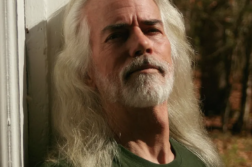THIS BEING the 100th anniversary of Tennessee Williams’ birth, Moisés Kaufman has created a reframed, meta-theatrical version of Williams’ short story “One Arm,” which was produced this summer at New York’s Acorn Theater by Kaufman and the Tectonic Theater Project (TTP). For Kaufman, bringing One Arm to the stage was a long labor of love involving numerous stagings and re-workings. The Tony Award-winning director, playwright, and co-founder (with Jeffrey LaHoste) of the TTP refers to himself as “the hardest-working Jewish Latino gay artist in New York.”
Justifiably, then, Kaufman has always related to “outsiders,” just as Tennessee Williams did. Williams wrote the story in 1945, published it in a collection of short stories in 1948, and converted it into a screenplay in 1967. However, despite passing interest by Marlon Brando, the script was never filmed. In the tale, a Navy boxing champ, Ollie Olsen, mutilated in a car accident, turns to hustling to survive, a desperate road that leads to death row. A press account described it as “an erotic fever dream of an American nightmare.”
Kaufman was born and raised in Caracas, Venezuela, by European Orthodox Jewish parents. His father was a Romanian Holocaust survivor who, at age eleven, in order to earn money for food, made yellow Stars of David that Jews were forced to wear. As a yeshiva student, Moisés was confused and anxious about his sexuality, hiding it from his own community. Although he studied business administration at the Metropolitan University in Caracas with the expectation of following his father into the food wholesale business, he was already hooked on stagecraft, to which he was exposed while attending an international theatre festival in Caracas at age fourteen. In his native Venezuela, he performed as an actor with the Thespis Theater Ensemble, one of the country’s foremost experimental companies.
His artistic journey brought him to New York in 1987, where he helped to organize the Tectonic Theater Project four years later. His first play, Gross Indecency: The Three Trials of Oscar Wilde (1997), which was based on court transcripts, letters, and contemporary newspaper clippings from the 1890’s, opened to broad critical acclaim.
A month after the murder of Matthew Shepard near Laramie, Wyoming, on October 6, 1998, Kaufman and ten company members traveled there and conducted interviews with residents of the town, which was traumatized by the crime and its aftermath. From these interviews they wrote the play The Laramie Project, which has been widely performed across the country, especially in high schools and colleges, ever since. Later made into a film for HBO, this “Our Town for the new millennium” reached a still larger audience.
Tennessee Williams often reworked material from his short stories for the stage. A case in point is his “Portrait of a Girl in Glass,” which he expanded into the 1944 break-out drama The Glass Menagerie. Kaufman was fascinated by the fact that “One Arm,” based on an amputee hustler that Williams met in New Orleans, lingered with the writer for so many decades. Like the screenplay, Kaufman’s minimalist staging relies on the audience’s willingness to suspend disbelief. The eight cast members play multiple parts, including sailors, hustlers, medical students, and chaplains.
Kaufman, who lives on Manhattan’s upper West side with Jeffrey LaHoste, his artistic collaborator and life partner of over twenty years, took time out from tweaking preview performances of One Arm to speak with me.






